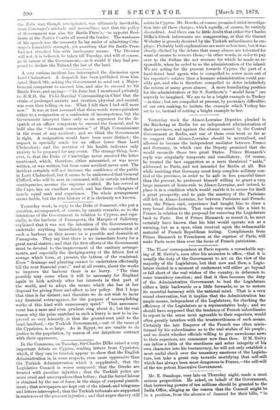The Zulu debate in the Commons began on Thursday, Sir
Charles Dilke making a speech universally acknowledged to be the best he ever delivered,—a splendid indictment of Sir Bartle Frere, whom he accused of breaking a peace which had lasted thirty years, by an aggressive policy. The speech, which is far beyond condensation, is a mine of facts, all tending to show that the High Commissioner meant war ; that the Government knew that, or ought to have known it; that they only forbade war at the twelfth hour ; and at they are now tying the hands "of a whipped child," but keeping him in power. Their minds had been lost in Afghanistan, till they had forgotten Zululand. Sir M. Hicks-Beach made a very temperate and able reply, the points of which were that Sir Bartle Frere had been censured for excess of zeal, and. not for incapacity, and was therefore retained in office ; that
the Zulu war, though precipitated, was ultimately inevitable, from Cetewayo's attitude and necessities ; and that the policy of Government was also Sir Bartle Frere's,—to appoint Resi- dents at the Native Courts all round the border. The weakness of his speech was the necessity he lay tinder of admitting Cete- wayo's formidable strength, yet asserting that Sir Bartle Frere had not attacked him with inadequate means. The Division will not, it is believed, be taken till Tuesday, and will of course, go in favour of the Government,—as it would if they had pro- posed to declare the Talmud the law of the land.



































